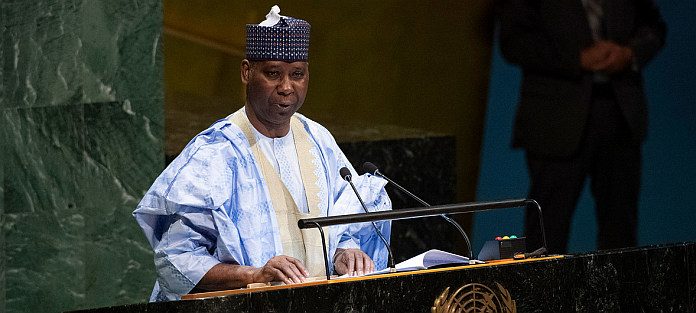NEW YORK, USA – The informal interactive dialogue, which was jointly convened by the General Assembly and Economic and Social Council (ECOSOC) presidents, aims to implement the vision of the 2030 Agenda to make global economic and financial systems fair and equitable.
Speaking at the High-level Panel on International Financial Accountability, Transparency and Integrity (FACTI) for Achieving the 2030 Agenda, Tijjani Muhammad-Bande warned that gaps, or the illegal siphoning off of government revenues, “have real consequences in all countries”.
From developed to developing countries, no nation is immune from financial “gaps and vulnerabilities”, the president of the UN General Assembly said on Monday.
While acknowledging the work of international bodies to promote cleaner, more transparent financing as part of implementing the Sustainable Development Goals (SDGs), Muhammad-Bande noted that many questions have arisen surrounding the gaps and vulnerabilities.
“By some estimates, the equivalent of ten percent of world GDP [gross domestic product] is held in off-shore financial assets”, he observed, adding that “corporate profit-shifting is collectively costing governments between $500 billion and $600 billion a year in lost corporate income tax revenue, and globally corruption is significantly draining our budgets”.
Citing “gaps, loopholes, and vulnerabilities”, the assembly president maintained that “new cases are emerging every day”, highlighting the negative impacts of pilfering, money laundering, tax evasion, bribery, and other financial crimes.
He reminded those assembled of their pledge “to leave no one behind” and spelled out that if this activity continues, “least developed countries will be unable to deliver adequate health care and education to their populations and fail to achieve our collective Sustainable Development Goals”.
“We have entered the Decade of Action and Delivery, and our focus must now be firmly fixed on implementing the ambitious and transformational blueprint of the 2030 Agenda for Sustainable Development”, Muhammad-Bande stressed. “Our aim is to contribute to efforts which will enable the global economic and financial systems to work better for everyone, everywhere”.
Our aim is to contribute to efforts that will enable the global economic and financial systems to work better for everyone, everywhere — UN assembly chief. He said the new interactive dialogue process seeks to “add insight in areas where they are needed, open up the conversation, and find ways to accelerate progress”.
He added he was looking forward to ideas and recommendations emerging “that Member States can get behind” and commended all Member States “for their commitment to fighting corruption and for taking steps to prevent bribery and money laundering”.
Muhammad-Bande also acknowledged agreements from Member States’ to share tax data, along with their commitment to asset recovery and return. “I recognize that the support from, and solidarity within, the international community has been, and will be, critical in facilitating successful outcomes”, he stated.
He encouraged those present to “galvanize multilateral support and strengthen international institutions to secure gains and make further progress. I urge you to lend your efforts to this movement, as you do to all other actions towards achieving Agenda 2030”, he concluded. “I am confident that by working together we can succeed in creating a better world for all”.
The joint initiative to establish the FACTI panel was announced in January.





